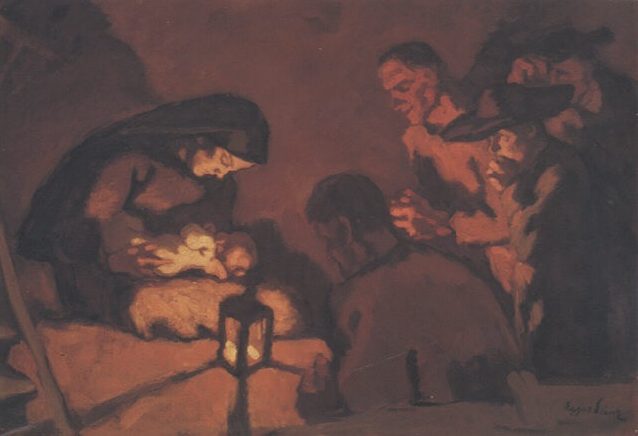From Fr. Kenneth Tanner:
Christmas is not about greatness but smallness, not about strength but weakness, not about force or coercion but invitation and welcome. Christmas does not need anyone to accept its joy or embrace its light.
Christmas happens in the margins, away from the spotlight. Christmas is elusive for the proud and the blustery, and threatening to every form of politics: Herodian or Roman, British or Irish, Indian or Pakistani, Russian or American, Chinese or Korean, Iranian or Iraqi.
Christmas is about the vulnerability of God, a revelation in human flesh that God is the servant of his universe; that if we serve the creation with God we volunteer for a hidden insignificance that somehow still holds everything together.
The human God works as the best servants do, imperceptibly. This seems mysterious to us because the world thinks of power as showy and imposing, but love (which is what God simply is) abandons arrogance and adorns herself with poverty.
Is there a final moment in history when the church visibly rejects the world’s means, the privilege of self-defense, our idolatry of weapons, and decides instead to beat our swords and spears into farming tools?
Will we come to trust the humility and weakness of God in Jesus Christ to vindicate us—not our armaments and our anger and our right to stand up for ourselves—to make manifest an already-accomplished defeat of darkness on Golgotha?
What if the end comes only after an unprecedented and great slaughter of Christians, after a worldwide crucifixion of the body of Christ, in which after great sacrifice in imitation of her Lord she dies and rises from the ashes of her demise by the Spirit?
What if God is all in all because the cruciform pattern of love that governs the universe and holds all things together and gives all living things breath is confirmed in a peculiar crucified and resurrected people with Christ as her head?
In the end Jesus tells us we will win not by defending our life, nor by trying to hold on to our privilege, but by giving up our life so that the world might live. Any genuine celebration of Christmas comprehends this.
As Stephen Colbert recently said: “The message of Christ isn’t that you can’t kill me. The message of Christ is you can kill me and that’s not death.”
“For it was life which appeared before us: we saw it, we are eyewitnesses of it, and are now writing to you about it. It was the very life of all ages, the life that has always existed with the Father, which actually became visible in person to us mortal men.”
1 John 1:2 (Phillips)
Copyright © 2020 by Kenneth Tanner
Fr. Kenneth Tanner is pastor of Holy Redeemer Anglican Church in Rochester Hills, MI, USA. Painting: Arcabas.
This article was first posted here on Facebook.






